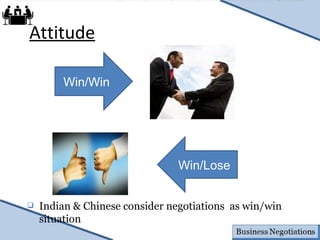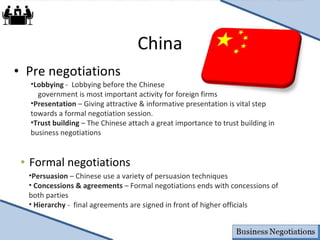Business negotiations
- 1. Business Negotiation in different countries
- 2. COUNTRY SPECIFIC? Globalization Culture affects negotiating style Competitive edge for companies
- 3. Business Negotiation: Asian Perspective
- 4. Goal Contract Relationship OR Asians believe in creating relationships
- 5. Attitude Win/Win Win/Lose Indian & Chinese consider negotiations as win/win situation
- 6. Personal Styles Formal Informal Chinese & Indians have different perception here
- 7. Communication Direct or Indirect Indirect Direct Asians are strongly in favor of direct way of communication
- 8. Team Organization Different Asian country has different view about team organization Indian prefer team organization & Chinese go for one leader approach
- 9. Video
- 10. India Negotiation strategy Negotiations are Part of the Indian Culture - Bargaining is ingrained into the Indian way of doing business Language - English has become the standard business language used in India Bureaucracy - be ready to face delays. Be ready to face family – family is integral part of an Indian . Responsibility lies on the top - When it comes to decisions and ultimate responsibility, the buck truly stops with management. Be flexible - As with other cultures, be prepared to be flexible at the negotiating table Be ready with their words - many Indians will not flat out say, "no" during a negotiation or business transaction but they expect you to be very direct
- 11. Japan Negotiation strategy Negotiation style - Japanese have a difficult time saying ‘NO’ Documentation - Written contracts are required. Long pauses - Japanese often remain silent for long periods of time. Understanding - Japanese prefer broad agreements and mutual understanding so that when problems arise they can be handled flexibly. Facilitator needed - Using a Japanese lawyer is seen as a gesture of goodwill. Concession no! no! - Japanese seldom grant concession. Contracts are not final - Japanese do not see contracts as final agreements so they can be renegotiated.
- 12. China Pre negotiations Lobbying - Lobbying before the Chinese government is most important activity for foreign firms Presentation – Giving attractive & informative presentation is vital step towards a formal negotiation session. Trust building – The Chinese attach a great importance to trust building in business negotiations Persuasion – Chinese use a variety of persuasion techniques Concessions & agreements – Formal negotiations ends with concessions of both parties Hierarchy - final agreements are signed in front of higher officials Formal negotiations
- 13. China Post negotiations Implementations & new rounds of negotiations – Negotiations in china almost always extends to post negotiation stage
- 14. Just be simple & Say AAL IZZ WELL














